They say you can’t go home again. That isn’t always true. Sometimes going home is as easy as booking a flight or setting sail. Which isn’t to say going home is always a good idea. Just see how going home worked out for these five protagonists…
“Jeffty Is Five” by Harlan Ellison (1977)
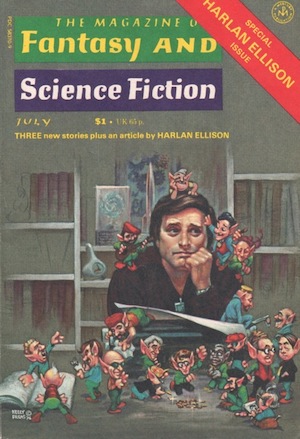
(Originally published in The Magazine of Fantasy and Science Fiction; collected in The Essential Ellison) Grudgingly admitting progress in certain fields such as medicine and transportation, the unnamed narrator laments the loss of so many other features of his childhood. Favorite shows are long gone, the traditional household products have been replaced by ersatz copies, and worst of all, candy bars are smaller and cost a whole twenty cents. These are all grim developments that all adults of a certain age must face.
But not Jeffty.
Jeffty is five. Jeffty is always five. It takes time and several sojourns away from and returns to his hometown for the narrator to grasp how bizarre Jeffty truly is. Not only is Jeffty ageless, the world in his immediate vicinity appears to be trapped in amber. How wonderful Jeffty’s gift, to make available an otherwise lost moment in time to those in his proximity… although Jeffty’s parents might disagree.
I would like at this time to complain that 95 cents is far too much for a paperback.
Lycanthia, or The Children of Wolves by Tanith Lee (1981)
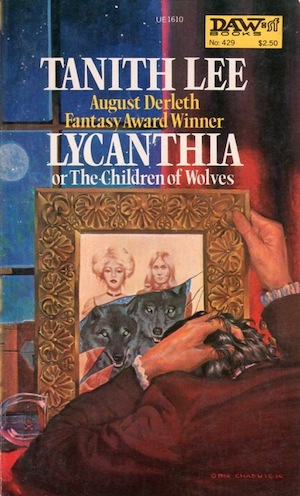
The home to which Christian Dorse returns is not one he himself has ever lived in. Lost to creditors by his improvident grandfather, the mansion has only recently been reacquired by Christian. Nevertheless, it is the Dorse homestead, a suitable estate where Christian can languish before he perishes of the illness from which he insists he is suffering.
The chateau is a meagerly staffed, half-ruined shambles. Its neighbors are a handful of suspicious, unfriendly peasants…and the de Lagenay siblings, about whom wild rumors featuring wolves and shape-shifting swirl. Revelations await Christian! Not least of which is what a terrible person Christian can be, given the opportunity.
This Tanith Lee gothic tale is a succession of discoveries, each one more alarming than the last.
The Apple-Tree Throne by Premee Mohamed (2018)
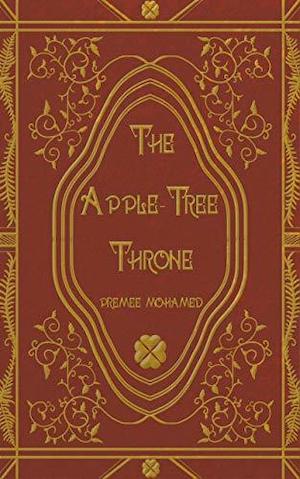
Major-General Theodore Wickersley vaingloriously led his men into an avoidable slaughter. Wickersley’s battlefield demise alongside his unfortunate subordinates did not redeem him in the eyes of fellow Britannians. Survivor Braddock, however, was willing to speak on Wickersley’s behalf, which endeared him to Wickersley’s family.
Wickersley family gratitude proves a lucky break for Braddock, who is otherwise without means or prospects. Braddock finds himself stepping into the life his former commander so foolishly lost. The one minor complication? Wickersley is dead but his ghost is not merely active, but increasingly enraged as Braddock is embraced by the family and the fiancée that Wickersley believes is still his.
The Greater Republic of Britannia does not appear to object to an officer promoted to a position far beyond his competence getting himself and a lot of soldiers needless killed out of pure arrogance. The Greater Republic isn’t some sort of meritocracy. They object to his having publicly embarrassed the Greater Republic.
The Mask of Mirrors by M. A. Carrick (2021)
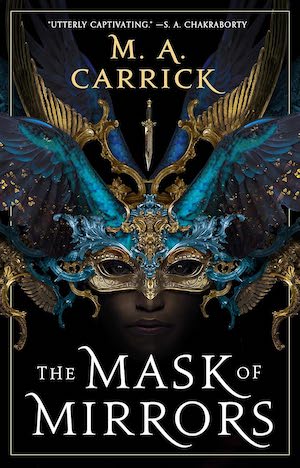
Dissatisfied by gang leader Ondrakja’s sadism-based management philosophy, Ren provided a gentle rebuke in the form of fatal poison in Ondrakja’s food. Ren and sister of circumstance Tess then prudently decamped from Nadežra. Now, however, greed outweighs prudence.
All Ren need do to get her hands on House Traementis’ vast wealth is to convince House Traementis that Ren is Letilia Traementis’ daughter. But Ren is not Letilia’s daughter. She is Letilia’s former maid. Long estranged from her family, Letilia is not present to confirm or deny the claim.
The odds appear to favor Ren’s confidence game… but House Traementis has many enemies. In order to victimize House Traementis, Ren will first have to save it.
Who doesn’t like stories with morals? The Mask of Mirrors has a number of morals, the most important of which seems to be “make sure someone is actually dead before making plans dependent on their being too dead to interfere.” Nadežra seems to house all too many people who are not nearly as dead as they should be.
The Master of Samar by Melissa Scott (2023)
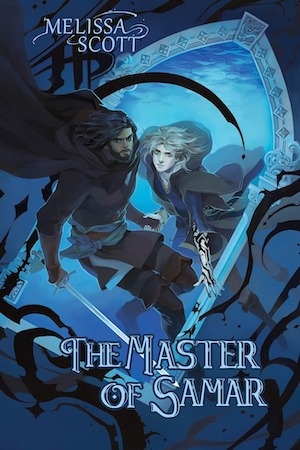
The product of a marriage of which his grandfather disapproved, Gilmyssin Irichels di Samar left both Samar House and the city of Bejanth. A magical adept in a demon-haunted world, Irichels had no problem establishing himself as a cursebreaker. He never expected to return to Bejanth, let alone return as the new Master of Samar.
No last-minute grandfatherly repentance is responsible for Irichels’ elevation to heir. Rather, it’s the fact that Irichels is the only living Samar left to lead Samar House. The deaths of every other Samar could be simply be chalked up to a surprisingly large number of exceedingly unlikely accidents. More likely, there’s a plot in which Irichels is now the sole remaining target. Alas, knowing someone wants one dead does not mean one can avoid assassination.
Bejanth is a secondary-world Venice, with the very important difference that the dangers from which it must protect itself include demons. Are Bejanth’s ambitious rich people any better at maintaining vital infrastructure when profit motive gets in the way than the rich and powerful of our world are? Read and find out!
As a theme or a plot point, the idea of a homecoming offers so many possibilities to authors that it is not surprising that the five works above are only a small sample of the many stories that feature homecomings. No doubt many of your old favorites were overlooked, not always because I’ve used them in previous essays. Feel free to remind me of them in comments below…










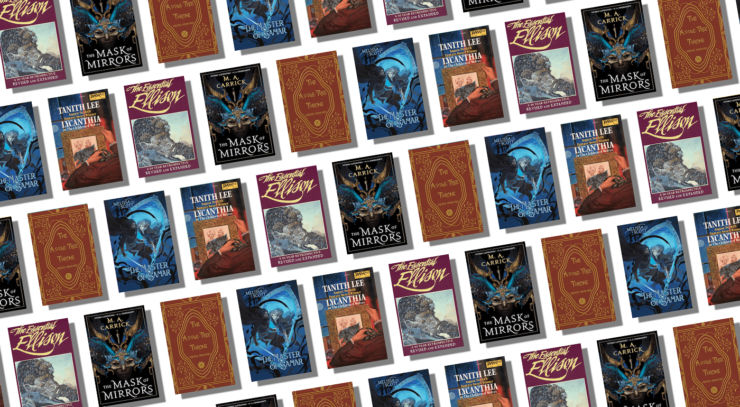
Clifford D. Simak’s “A Choice Of Gods”.
The entire population of Earth, except for a few Midwesterners, a Native American tribe, and a lot of robots, is moved by Alien Space Gods to … somewhere unknown.
Those left behind develop immortality and psionic powers.
But the taken have just found Earth again. Hilarity ensues.
(the book is better than my synopsis, it’s one of Simak’s best)
The first paragraph about Lycanthia looks like it should have “reacquired” instead of “required”.
Fixed, thank you!
Three of T. Kingfisher/Ursula Vernon’s horror books (The Hollow Places, The Twisted Ones, and A House With Good Bones) start with the protagonist returning to the family home (recently inherited in the former two, still occupied by her living mother in the the latter), whereupon there are strange things in the woods, or a portal to an interdimensional nexus shaped like a haunted swamp, or a very strange rose garden, and terrifying mysteries to unravel.
Ah, The Lord of the Rings also qualifies :)
Citizen of the Galaxy? Or has that one been reviewed already?
In Lois McMaster Bujold’s ouevre, both Cordelia’s return to Beta Colony in Shards of Honor and Mark’s to Jackson’s Whole in Mirror Dance are somewhat fraught. (Cazaril’s return to Valenda in The Curse of Chalion goes better, at least initially.)
The action in Steven Brust’s Brokedown Palace is precipitated by one of the brother’s return from across the mountains in the Dragaeran Empire, IIRC.
Objection, your honor; witness has neglected his feetnote.
In a weird way, the ST:TNG episode “Tapestry” fits today’s theme.
More rectilinear to the theme, though, is just about any story where time dilation (or other arcane effects) causes the protagonist to return to a home changed beyond recognition: The Forever War is the prime example of this, but Heinlein used it in two juveniles (albeit more gently): Time for the Stars and, for the “other arcane effects” part, Tunnel in the Sky.
Of course, it goes all the way back to Washington Irving’s tall tale about Rip van Winkle…
Oh, much further back than that. Folklore is crammed with stories like that. Usually it’s faeries responsible rather than Irving’s ghosts.
Drawing Blood, by Billy Martin under his deadname Poppy Z. Brite, is a dark novel about the only survivor of a murdered family who returns to the town and the house where it all happened. Very dark, but really captivating.
The Sword of Aldones (later expanded as Sharra’s Exile) grew out of the Rilke quote ~”The stranger who comes home does not make himself at home, but makes home strange.” The later version is in some ways weaker — moralizing and with a debatably plausible happier ending; the original ends with the narrator realizing that his home world is irretrievably changed.
I seem to recall a very old story about a guy named Odysseus who comes back home and finds things not to his liking. More recently, in Trullion: Alastor 2262 Glinnes Hulden returns to his ancestral home after ten years of military service to find its affairs in disarray, and spends the rest of the book putting them right again.
In Heinlein’s “It’s Great to be Back” a couple returns home and discovers that, while it is exactly the same as before, they don’t want to live there any more.
“Jeffty is Five” — along with LOTS of other Harlan Ellison stories, classic, award-winning, and otherwise — can also be found in the 2024 publication, GREATEST HITS by Harlan Ellison.
Victoria Goddard’s Greenwing and Dart books start with the protagonist going back to his hometown, mentioned in a travel guide as the most boring place on the continent, after his university career ended in disaster. He thought the most pressing problem would be his family scandals, a reliable source of town gossip for generations, but it turns out there’s a lot more going on, and the death cult in the woods is only the beginning.
“Time in Advance” by William Tenn a would-be criminal returns home after serving a harsh prison sentence for a murder he’s now at liberty to commit. But his intended target might be the person who’s wronged him the least.
That was William Tenn, was it?
Thanks. I remember the story, but not the author or the title.
Dianna Wynne Jones’ Homeward Bounders – which seemed so much sadder when I reread it as an adult.
Cazaril’s homecoming in Chalion was the first that came to my mind, although as said above, it’s not so uneasy, at least when he first gets there